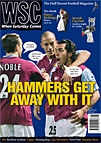 Ken Bates takes on the Inland Revenue
Ken Bates takes on the Inland Revenue
As our press day loomed, our thoughts turned to Leeds United and we began to write about Ken Bates’s latest victory. Which was what would surely happen. After all, the man who was on the brink of disaster at Chelsea, with unserviceable debts of more than £100 million, was able to walk away with £18m when Roman Abramovich arrived on his white charger. Bates had bought Chelsea for just £1 originally and now seemed likely to snap up Leeds for another astonishingly low sum.
As the deadline approached for a legal challenge, Bates had upped his offer from 1p in the pound to 8p, amid suggestions that Her Majesty’s Revenue and Customs were considering legal action. Yet still we felt confident that Bates would triumph and he warned everyone that the alternative was oblivion. Four o’clock came and went and the Press Association carried no news of a challenge. That changed at 4.20.
It was difficult to know what to think – or what to write. One of the first things to be said about Bates is that he is famously litigious. This simple fact colours every media report on his various dealings, including in relation to recent events at Leeds. It remains the case that there is an interesting book to be written about him. Bates’s past business dealings were laid out in forensic details in Tom Bower’s award-winning book Broken Dreams. The 25 pages on Bates’s career in property development and the banking industry, and what Bower terms “a history of minimising his taxes and encountering insolvent companies”, are very difficult to follow, as you would expect, but rewarding.
Back in WSC 1, published in March 1986, it was suggested that Bates, already steeped in controversy in his role as Chelsea chairman, was involved in football in order to “squeeze every last drop of prestige, power and money out of it”. At the age of 75, Bates still appears to be driven by a constant need to prove himself via the public platform provided by club ownership. The game has enriched him, too, thanks to Abramovich’s rescue of Chelsea, but above all he’s involved because he enjoys the fame and even the notoriety. He doesn’t much care if he gets barracked by Leeds fans in songs about his Chelsea connections. His involvement in football has enabled him to be a national figure.
What happens next at Leeds is anyone’s guess. Bates had warned that any challenge to his takeover would be the end of the club and fans were understandably anxious. One, Matthew Knowles of The Square Ball, said that “the consequences for Leeds fans – who have done nothing wrong in this saga – could be devastating” and threatened the local MPs who raised questions about Bates in the House of Commons with trouble at the ballot box. “This challenge is not in the best interests of Leeds fans or the promotion prospects of the club.”
Yet such gloom may prove unnecessary. The Football League had voted against the offer of 1p in the pound and could consider not transferring the club’s right to play in League One to the new entity. This would lead to the administrators asking for fresh offers and it was clear that at least one consortium were still willing to bid.
But imagine if the worst did happen. Some observers have already been surprised that Leeds fans haven’t formed a breakaway club, amid the chaos of recent years. This has been done voluntarily by supporters elsewhere, such as those behind FC United, who feel disenfranchised – a term that applies more literally to those who launched AFC Wimbledon after MK Dons stole their club.
“From 4pm on Tuesday there’ll either be a Leeds United or there won’t,” Bates had said. “It’s not about personalities, it’s about Leeds United and the many people who support the club on and off the field.” Not surprisingly, such words had an effect. But when Leeds City went bust in 1919, interest in football there did not die. Leeds United emerged in their place. It was easier to be reborn then – with no pyramid, the new club were inserted into Division Two. To restart at a lower level would be very painful. But fans will never be in a position of strength while they continue to give cash to the new board, because the withholding of money is the one point of leverage they are able to use.
Just as it is only six years since Leeds were in the Champions League semi-finals, in another six years a new club, owned and run by the supporters, could be not too far away from League One. The real value in Leeds is the supporters. That won’t change whatever happens in the next few weeks. And if football has to say farewell to Ken Bates in order for this rebirth to happen – well, we’ll find a way to cope.
From WSC 246 August 2007